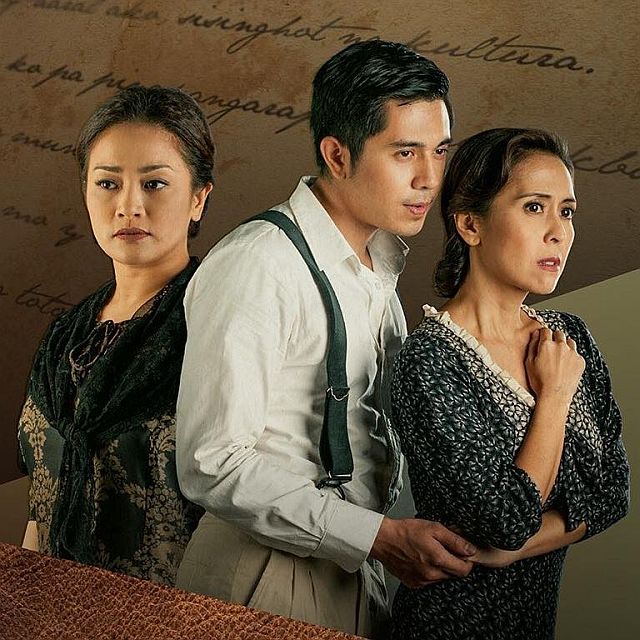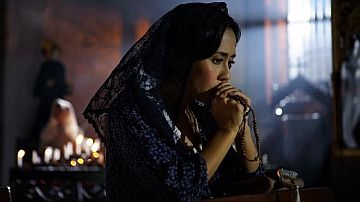“I AM on the right age,” confirms Rachel Alejandro, 20 years later since she slipped into the character of Paula Marasigan—the tweetums, Jolina Magdangal of the pre-World War matandang dalagas—in the restage of a Nick Joaquin musical in 1998. “We don’t want to age anyone. Everyone should be exactly at the right age for the role.”
Now on another podium, the singer has reprised the role with more accurate nuances and a scientific approach to the kinesics of the script.
“Loy really wanted us to study how the women in that period acted, how they moved, which is a lot more poised,” she relates the pragmatic moviemaking of Loy Arcenas, the Cebuano director of the film version of Nick Joaquin’s “Ang Larawan,” which premieres tomorrow, Christmas Day, as entry to the Metro Manila Film Festival (MMFF) 2017.
Shot in an ancestral house in Batangas and under the helm of Ryan Cayabyab, the musical scoring is attuned to specific reactions, societal backgrounds, and psychological structures. The moral of the story nestles in the pivotal mischief of Tony Javier (Paulo Avelino) that alienates Paula from her sister Candida (Joanna Ampil).
“There’s a steamy seduction between Paulo Avelino and me,” she scares up the thrill, sitting at a coffee table in a cake shop in Banilad one Sunday afternoon. In a black cold-shoulder shift dress and ankle boots, she just breezed in from a rendezvous with fans in SM City Cebu.
But whatever age or year or city she is in, she always carries a torch in the unofficial race of show business. She has been in spin-offs of Broadway favorites “Rent” and “Spamalot.” After the lifestyle program “Real Talk” on CNN Philippines signed off months ago, she has emerged with another blueprint of a new television show. She is also on the brink of the Cebu release of her third book, “21 Days to a Sexier You,” an auxiliary to her food delivery business, The Sexy Chef.
The advent is a wrench from her famous slew of original hugot songs—“Paalam Na,” “Nakakapagtataka”—that once wooed us (we, the hopeless
romantics).
As the possibility of a best actress nomination intensifies, Rachel Alejandro discusses the force behind the success, its precarious beginnings, stumbles, and the ever-expanding empires of Philippine entertainment.
And what could be the most devastating of all.
You have been part of both the theater and the film versions of “Ang Larawan.” Share to us your experience.
“Ang Larawan” is the film adaptation of “Ang Larawan” the musical, which we staged in the 90s. Back then, I was part of the second run, the repeat run, when the actress who was supposed to play that role got sick. I was the last- minute addition. I was way too young for the part. The only reason they picked me was because I already knew the music because I was frequently hanging out with my manager, and basically my dad was part of the cast the year before. I was already familiar with the music, at least. They asked me to step into the role a little over a week before the opening day. I now play the role of Paula Marasigan, still the same role I took in the 90s version. It’s based on the play of Nick Joaquin. I have been in love with “Ang Larawan.” And it was always at the back of my mind.
Your father (balladeer Hajji Alejandro) was part of the original cast. Why isn’t he part of the film adaptation?
I was really, really hoping that my dad would reprise his role in the film, but the director is very particular about casting the right age. My dad played Don Perico in the 90s musical. They would put makeup on his hair to make his hair gray. Twenty years later, Loy was like, “No, we are not going to do that. We’re not going to age people. Everyone should be exactly at the right age for the role.” We found my dad to have too much hair, still too young. Imagine 20 years later, he is still too young. I was heartbroken because I was too attached to my dad’s singing in the musical version because the song of Don Perico’s is the most beautiful. When it is sung by a real singer, it gives you goose bumps. In the film version, it’s now Robert Arevalo who “looks” the part but is not primarily a singer. He sings, but then the song becomes spoken-sung. It’s no longer really a song. I am so heartbroken
because I am so in love with the original way that we’ve done it. But I knew that if we want to make it into a film, everything had to be way, way more realistic than stage.
What motivated the producers to make a film version of it?
We have been thinking of bringing “Ang Larawan” around the world because of all the theater plays that my manager Tita Girlie’s (Rodis) company has produced, “Ang Larawan” is our favorite. It’s a personal favorite also because we think this is Ryan Cayabyab’s best work. One day, we were thinking, “No, it’s probably not financially feasible to bring that many people around different cities in America.” Let’s say if we were able to pull that off, it would be too big of an undertaking. Not exactly easier, but we were thinking that maybe the more doable thing is to make it into a film, which could be shown in other countries.
Twenty years had passed before it became a movie.
We always talked about it. We really have not put it together until five years ago that we finally settled on a director, Loy Arcenas. He is actually from Cebu. He is an award-winning set designer from Broadway. “Ang Larawan” is just his third film. When we found the director, work started. We had to condense a three-hour musical into a two-hour film. We had to chop out like one third. Loy decided that it can’t be sung through. It would not be easy to understand. For the film version, it would be
spoken and sung.
Compare your performance of Paula Marasigan now and 20 years ago.
Still the same, but I’m on the right age. Back then, I was 20 years too young. There’s a very, very big difference. I didn’t
really work at all in my performance in 1998 version because I think they were just happy to have anyone fill in the role, out of desperation. As long as I was singing the songs well and I knew the line, the lyrics, the blocking, I just performed it as organically as I could. For the film version, Loy really wanted us to study how the women in that period acted, how they sat, how they talked, how they moved, which is a lot more poised compared to the women in this generation. This is the more accurate portrayal of my character. Joanna and I, we rehearsed for a year.
Tell us more about how you approached the humanity of Paula Marasigan.
There are just so many aspects. This is what I heard: There are actors who love to do improvised-style acting. They just get the script and get the gist of the story, and I am just going to do it my way. I heard that is a Coco Martin trademark. He is told what the script is about, and he does it his own way. So that works very, very well for him. It’s not necessarily my style. The character that I am playing is not me. It’s the most different from the real me so there shouldn’t be any “me” in it. That’s is why you have to remove any shreds of yourself … even the way I acted, the way I spoke, the way I sang, the way I moved. It had to be 100 percent that character.
How did you prepare for the film version?
The difficulty is I have to change my singing style for this particular film because of the period. I have to remove all the pop influence in my singing, so I had to take voice lessons.
Are you up for this festival’s best actress?
No. I do not know. I am for Joanna Ampil, whose role really holds the twists and turns of the story.
Since you’re the established singer in the cast, do you coach some of them who are not professional singers?
No. Parang I’m just one of them because I had to take voice lessons pa nga. Paulo Avelino is the least experienced, non-singer, non-theater actor because everyone else has had stage experience. Do I coach? No, I am the one who is being coached. This year I did Spamalot. We did several shows in July and August, and for that particular part the range was alto to soprano. Some of the singing went way higher than my comfort zone, but I had to take twice a week voice lessons just to get to that level. Still, I’m a work in progress, really.
Broadway seems to be very smooth for you.
It’s difficult. But even the other musicals that I have done are still pop and rock. They’re still in that style. I did “Rent,” and that’s rock. I did “Aida,” that’s also rock. The plays that I am casted in are usually suited to my style. The kind of performance I did for “Spamalot” is like a rip-off from the “Phantom of the Opera”; it’s soprano, so I don’t have that kind of voice. I have to learn that placement. I was cracking and piyo-king the whole time in the first rehearsals. I was panicking. I was crying everyday to my husband. I just kept going to the voice lessons, and by the time it opened in July (2017), I was not even 100 percent sure.
Why did you crossover from pop to Broadway?
It’s something I love ever since. I was doing different musicals in my early 20s. There has never been that vocally challenging except “Spamalot” up until now. With “Ang Larawan,” I had to—it wasn’t an uncomfortable key to hit. It was more that my pop singing style would still show, but it had to be completely removed. So even my singing had to reflect that style. My voice is big, so it had to be manipis, smaller, and more airy like the character.
What scenes should we look forward to?
There’s a very steamy seduction scene between me and Paulo Avelino, so far, those who have seen the preview, said it was a very good scene. There’s also another scene—if they are familiar with the play, the most famous part—called “walang ilaw” when the sisters think the electricity was cut off because they could not pay the bill and what mayhem that followed after. They come from a rich family; they had a lot of pride, and it’s a disgrace. That’s a very strong scene.
It’s a period film. How can the young generation relate to it?
The theme is universal. They may disagree with the choices. Some situations of course are specific to the time period, but for instance, I think that, at the core, the story really is about love between sisters and how that love triumphs despite the betrayal of Paulo Avelino’s character. At the end of the day, even if people don’t get the story or the motivations of the characters because they are too alien for them, the music is incredible.
Are you more picky with projects now?
I am not picky with roles. I do not have people beating up my door offering me movie roles. Let’s be honest. I do like to do at least one theatrical role a year and the rest of the year, I do more parang what pays the bills.




